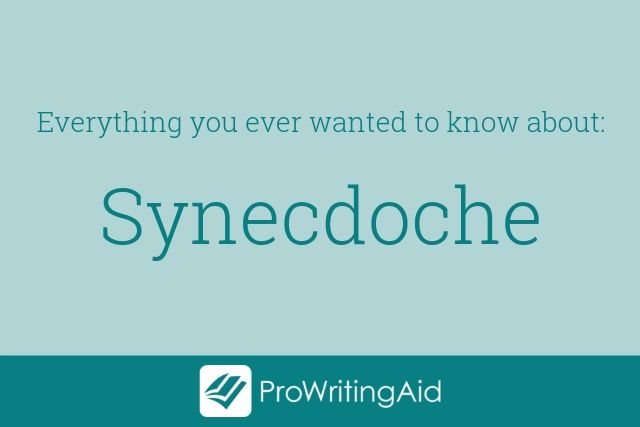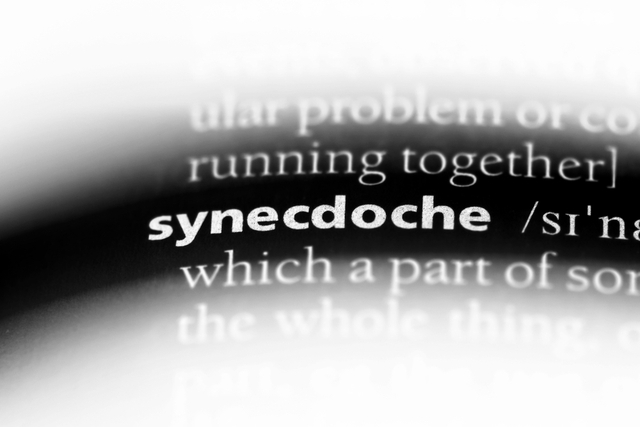Synecdoche
Synecdoche part of the figurative language family, which includes figures of speech such as metaphors, similes, personification, etc. It’s when you use a part of the whole of something to refer to the object. For example, everyone knows if you tell someone to check out your new wheels, you’re referring to the car as a whole. The wheels, a part of the car, are representing the whole.
Using synecdoche is an interesting way to transform an everyday term into something thought-provoking. But sometimes it gets confused with another figurative language device, metonymy.

What is the difference between synecdoche and metonymy?
Some experts debate that synecdoche is a type of metonymy, but we’ll leave that to them to figure out. The main difference is that synecdoche uses a "part" of the whole to refer to it, while metonymy finds another related term to replace it with. Let’s look at a few examples.
An example of metonymy is referring to the Queen of England as the crown. Crowns are related to royalty, but they not a part of the royal personages.
Examples of synecdoche
You’ve probably heard of soldiers referred to as boots on the ground or champagne referred to as bubbly. These are examples of a part that represents a whole. Here are a few other ways you can use synecdoche.
The whole represents a part
You can flip a synecdoche by using the whole to refer to just a part.
- If you say "the restaurant" was lovely, you’re most likely referring to the food, the atmosphere, or the wait staff.
- When someone complains that "the world" is not treating them well, they’ve not really encountered the entire world, just those in their circle.
- The word "police" usually means a single officer or more, but not the entire police force.
- When you read about "the Pentagon" making decisions, it refers to a few generals, not everyone in the building.
- People say "the BBC" printed a new story when really a specific journalist likely wrote it.
A specific brand or class represents the whole

For example:
- "a Kleenex" represents all disposable tissues
- "a Band-Aid" refers to all adhesive bandages
- "Coke" in some parts of the US refers to any variety of cola
- "America" means the United States, but actually the Americas are a few different countries
- "milk" refers to cow’s milk, not other forms of milk like goat’s milk
A material represents an object
Sometimes the material used to make something represents the object itself.
- Everyday eating utensils are called "silverware" even though they’re not made of silver any more.
- Piano keys are called "ivories" even though they’re not made of ivory any more.
- Bullets are sometimes called "lead."
- Golfers call their longest golf club a "wood."
- String instruments are just called "strings."
Containers represent their contents
- "She drank the entire cup," referring to drinking the contents of the cup.
- "Keg" represents a keg of beer.
- "Barrel" refers to a barrel of oil.
Examples of synecdoche in literature
In Hamlet by Shakespeare, the ghost of Hamlet’s father implies Claudius killed him. He says: "So the whole ear of Denmark is by a forged process of my death rankly abused," to imply that the whole population of Denmark has heard about his death.
In F. Scott Fitzgerald’s The Great Gatsby, he refers to Gatsby as an "Oxford man." He’s actually referring to someone who’s attended the English university and is a person of a certain class, wealth, and learning.
Toni Morrison uses a fantastic synecdoche in Beloved when she writes:
- "This is the flesh I’m talking about here. Flesh that needs to be loved. Feet that need to rest and to dance; backs that need support; shoulders that need arms, strong arms I’m telling you."
While she’s referring to parts of the body that have their own needs, she’s talking about the importance of community and the value of life.

Final thoughts
Synecdoche is another tool or device writers can use to describe the mundane and the ordinary in a creative, fresh way. And the next time you hear "boards" to describe the theater stage, you can tell everyone within earshot that’s a synecdoche.